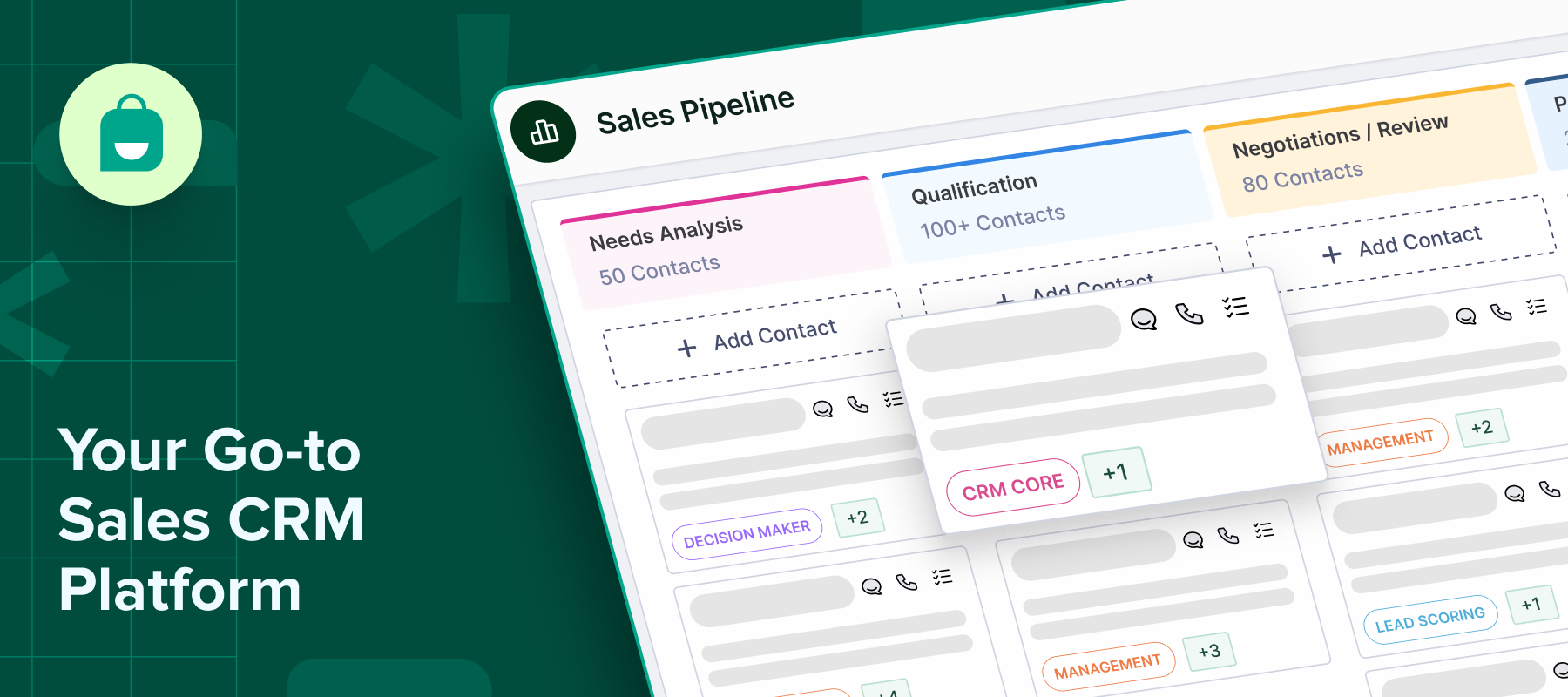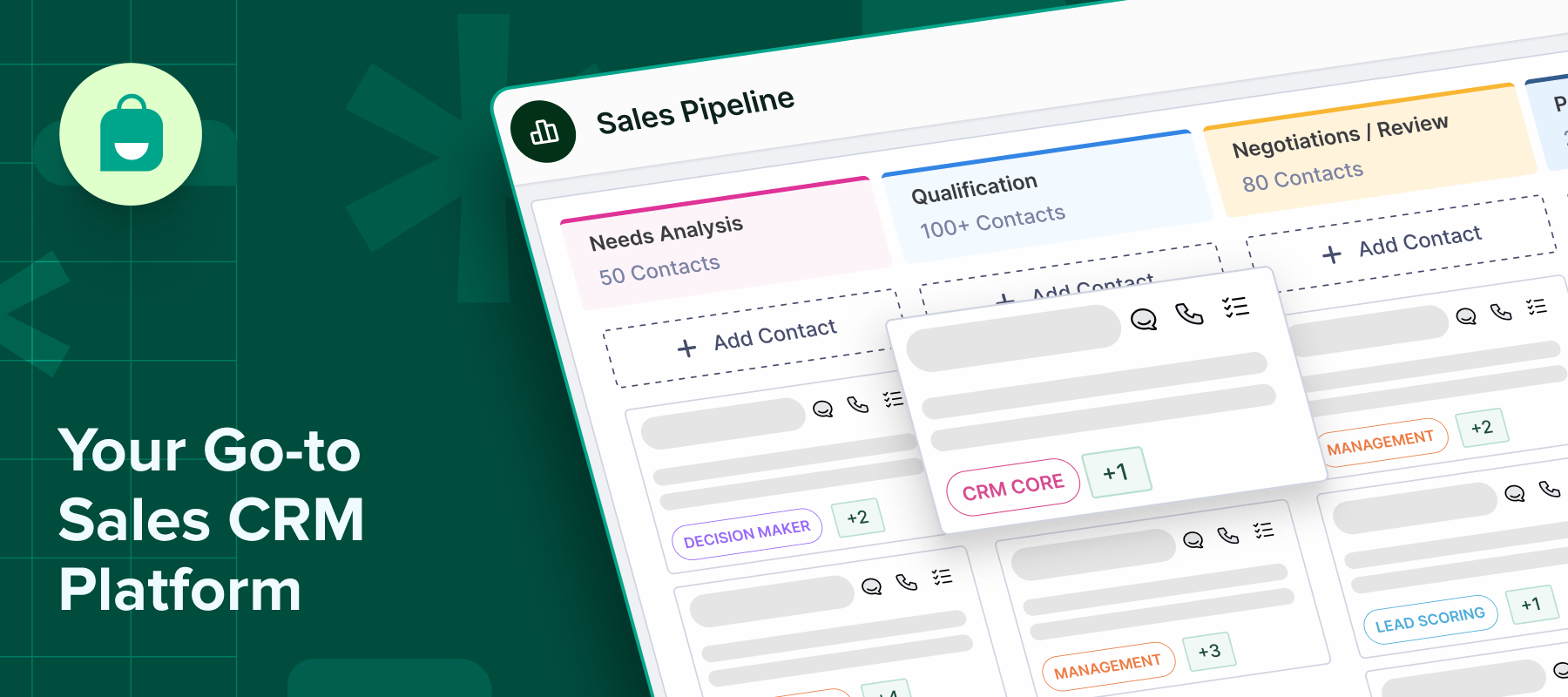E-commerce in 2025 is smarter, faster, and much more customer-driven than it ever was. To keep up with the rising demands and shifting preferences, brands need to effectively listen, respond, and build real relationships with their customers.
And that begins with effective capturing and management of customer conversations with a smart sales CRM. But then the question is, what CRM is right for you?
We are here to help you find the perfect sales CRM for your e-commerce business, to help you stay organized, connected, and ready to grow.
Key challenges faced by e-commerce businesses
Some of the major obstacles and challenges e-commerce businesses face include:
High cart abandonment rates
E-commerce brands are often struggling with users dropping off before completing purchases, and it can be difficult to recover these lost sales.
Customer retention in a competitive market
There are endless options for customers at their fingertips, and they are likely to switch brands, making customer retention hard to achieve and maintain.
Fragmented customer data across platforms
When customer data is scattered across different tools, it is difficult for teams to get a clear, unified view of customer journeys.
Limited visibility into the sales funnel
Businesses can often find difficulty in spotting bottlenecks and major drop-off points, and optimizing conversions, without adequate insights into how leads move through the sales process.
Manual follow-ups and inefficient workflows
Manually chasing leads can consume time, lead to inconsistent communication, and result in missed opportunities, significantly slowing down growth.
Essential features of a sales CRM for e-commerce
Look for these essential features to ensure that your choice of sales CRM delivers on your e-commerce business needs:
Real-time integration with e-commerce platforms
Your CRM should offer integration with major e-commerce platforms like Shopify, WooCommerce, or Magento.
Automated segmentation and targeting
Look for CRM tools that can automatically group customers based on behaviour and purchase history to help you share more relevant promotions and thus improve conversions.
Abandoned cart recovery tools
The sales CRM should also have built-in tools like follow-up messages, discounts, and reminders that are triggered when customers leave products behind in their cart.
Order and inventory tracking capabilities
Check if the CRM also offers dashboards that allow you to monitor inventory levels and keep track of customer orders from checkout to delivery.
Multi-channel communication
The CRM tool should also allow you to engage customers across their preferred channels and manage conversations through channels like email, SMS, and WhatsApp.
Top sales CRM solutions for e-commerce in 2025
Here are some of the best CRM solutions e-commerce brands can go for in 2025:
HubSpot CRM
HubSpot CRM is a popular choice with broad integration capabilities and marketing automation features. It is a good choice for businesses looking to manage customer relationships, segment customers, and run campaigns from one place.
Key features:
-Reporting and analytics tools
-Contact and deal management
-Email marketing and automation
Zoho CRM
Zoho CRM offers a flexible and affordable option for businesses looking for a customizable CRM that supports multichannel communication and is suitable for any small to mid-sized e-commerce brands.
Key features:
-Custom workflows
-Inventory and order management integration
-Omnichannel engagement
Interakt CRM
Interakt offers a reliable and feature-rich CRM solution built to help e-commerce businesses manage WhatsApp-based customer communication. It is a perfect choice for brands looking to boost conversions through real-time conversations, abandoned cart recovery, and order updates, from right where customers already are.
Key features:
-Seamless WhatsApp Business API integration
-Customer tagging and smart segmentation
-Shared team inbox and fast, collaborative responses
-Automated cart recovery messages and reminders
How to choose the right CRM for your e-commerce business
Below are a few things to keep in mind when choosing a CRM for your e-commerce business:
Match CRM with your store platform and tools
Make sure that the CRM you choose can integrate smoothly with your existing store setup, whether it’s Shopify, WooCommerce, or Magento, as well as with your existing stack of tools, to ensure a frictionless flow of data.
Evaluate automation and campaign features
Look for tools that offer built-in automation for cart recovery, upselling, and personalized campaigns that save time and boost results.
Consider your sales volume and business size
The CRM you pick should also align with your current business size and sales volumes, but should also offer the flexibility and feature set to help you grow as your orders, channels, and teams expand.
Prioritize support and onboarding
A good CRM offers responsive support and an easy onboarding process, which can help your team get started quickly and avoid downtime.
Test the CRM through a free trial or demo
Try the CRM firsthand to get a clear sense of its features, usability, and benefits. You need to see how it fits your team and your short and long-term business goals.
Benefits of using a sales CRM in e-commerce
These are some of the major e-commerce benefits businesses can expect from using a sales CRM:
Increased customer retention and repeat purchases
With the ability to share timely, personalized follow-ups, a CRM can help build stronger relationships and encourage customers to come back for more.
Improved conversion through targeted campaigns
Using smarter segmentation, e-commerce businesses can better target campaigns and deliver the right offers, deals, and content at the right moment, leading to better engagement and sales.
Streamlined communication across channels
By using CRM to manage emails, WhatsApp, and more from one place, you can ensure that your team stays consistent and quick in customer conversations.
Better sales and campaign insights
With real-time performance data that CRMs provide, businesses can track and see what is working, spot gaps, and effectively improve their campaign strategies continuously.
Time and cost savings via automation
From auto-replies to cart recovery, CRM automation can help reduce manual work and allow your team to focus on growth-driving tasks.
Conclusion
The choice of a good sales CRM can be the deciding factor in terms of improving conversions, customer retention, and efficient scaling for your e-commerce business in 2025. This can not only streamline your operations but also arm your team with smarter insights and powerful automation.


